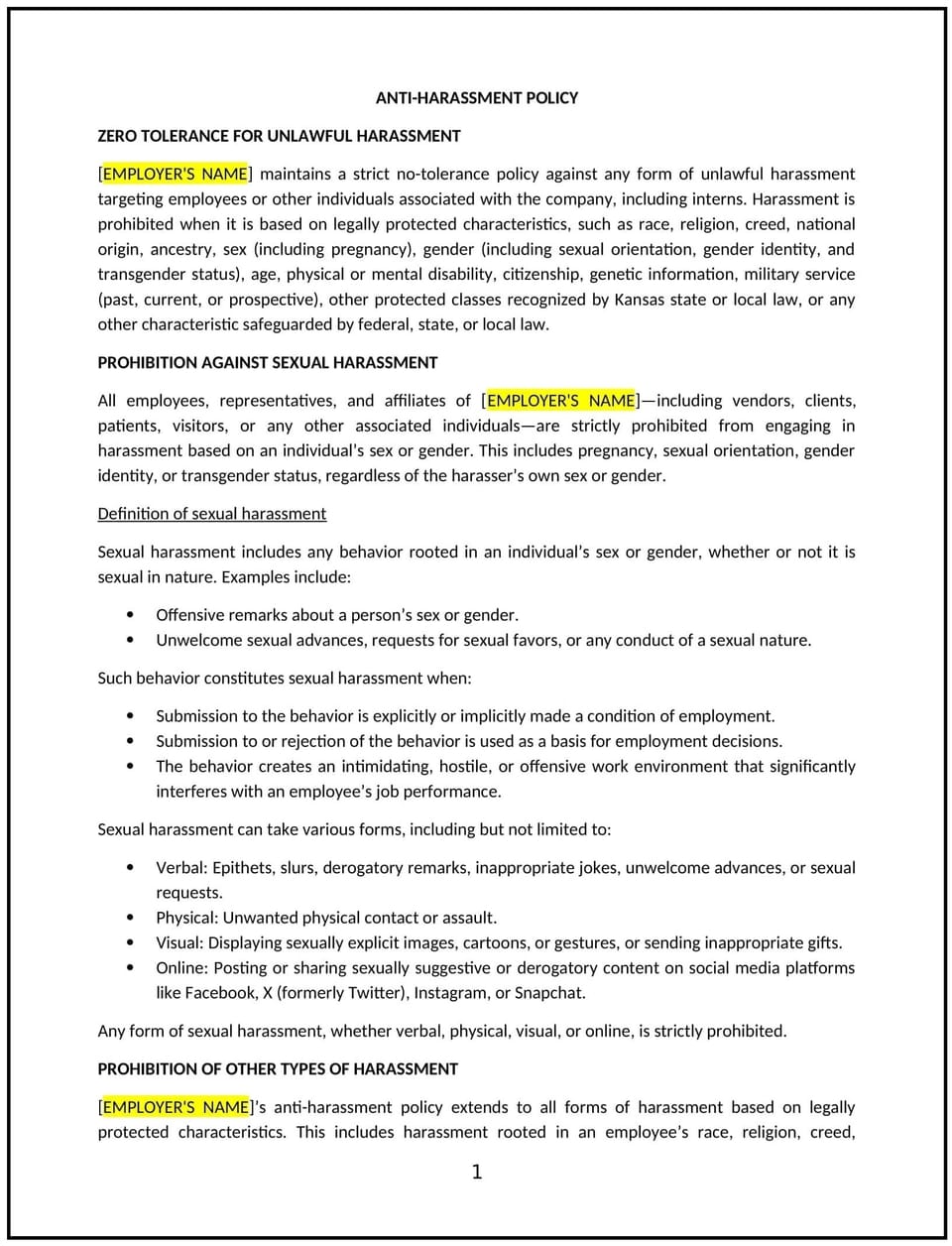Anti-harassment policy (Kansas): Free template

Anti-harassment policy (Kansas)
An anti-harassment policy helps Kansas businesses establish clear expectations for maintaining a respectful and professional workplace. This policy outlines what constitutes harassment, how businesses should handle complaints, and the steps to prevent inappropriate behavior in the workplace. A well-structured policy promotes a safe and inclusive environment while minimizing conflicts and legal risks.
By implementing this policy, businesses can foster a culture of respect, address harassment concerns effectively, and create a positive workplace for all employees.
How to use this anti-harassment policy (Kansas)
- Define harassment: Businesses should clearly describe behaviors that constitute harassment, including verbal, physical, and visual conduct that creates a hostile work environment.
- Establish reporting procedures: Businesses should provide employees with clear, accessible methods to report harassment, including anonymous reporting options if possible.
- Outline investigation steps: Businesses should define how harassment complaints will be reviewed, ensuring confidentiality and fair treatment of all parties involved.
- Implement preventive measures: Businesses should promote respectful workplace behavior through training, leadership example, and clear policies on inappropriate conduct.
- Address retaliation concerns: Businesses should prohibit retaliation against employees who report harassment and establish safeguards to protect those who come forward.
- Set disciplinary actions: Businesses should outline the potential consequences for employees who violate the policy, ensuring consistent enforcement.
- Review and update regularly: Businesses should periodically assess the policy and make adjustments based on workplace feedback and legal considerations.
Benefits of using an anti-harassment policy (Kansas)
- Promotes a respectful workplace: Encourages professionalism and discourages inappropriate behavior.
- Reduces legal and reputational risks: Helps businesses mitigate workplace conflicts and potential claims.
- Strengthens employee trust: Provides employees with confidence that concerns will be taken seriously and addressed properly.
- Establishes clear expectations: Defines appropriate workplace behavior and prevents misunderstandings.
- Encourages early intervention: Helps businesses address issues proactively before they escalate into larger conflicts.
- Supports workplace morale: Fosters an environment where employees feel safe, valued, and heard.
Tips for using this anti-harassment policy (Kansas)
- Communicate the policy clearly: Businesses should ensure all employees understand what constitutes harassment and how to report concerns.
- Offer training and awareness: Regular training on harassment prevention helps reinforce expectations and appropriate workplace behavior.
- Provide accessible reporting channels: Businesses should offer multiple ways for employees to report harassment, ensuring confidentiality and trust in the process.
- Address complaints promptly: Businesses should investigate complaints in a timely and impartial manner to maintain fairness.
- Document incidents properly: Keeping thorough records of reports and investigations helps businesses track trends and respond effectively.
- Apply policies consistently: Businesses should enforce anti-harassment measures fairly across all levels of the organization.
Q: Why should Kansas businesses implement an anti-harassment policy?
A: Businesses should implement an anti-harassment policy to create a professional, respectful workplace and reduce risks related to harassment claims. A structured policy ensures that concerns are addressed consistently and fairly.
Q: What should businesses include in their anti-harassment policy?
A: Businesses should include a clear definition of harassment, reporting procedures, investigation steps, disciplinary measures, and protections against retaliation. These elements help set expectations and ensure accountability.
Q: How should businesses handle harassment complaints?
A: Businesses should establish a confidential reporting system, investigate complaints promptly, and take appropriate action based on the findings. Ensuring a fair and impartial process encourages employees to report concerns.
Q: What steps should businesses take to prevent harassment?
A: Businesses should provide regular training, reinforce professional workplace behavior, and encourage open communication between employees and management. Leadership should set a strong example by upholding workplace standards.
Q: How can businesses protect employees from retaliation?
A: Businesses should make it clear that retaliation against employees who report harassment will not be tolerated. Providing anonymous reporting options and follow-up support can help ensure employees feel safe when raising concerns.
Q: How often should businesses review and update their anti-harassment policy?
A: Businesses should review their policy at least annually or whenever workplace conditions or legal requirements change. Regular updates ensure policies remain relevant and effective.
This article contains general legal information and does not contain legal advice. Cobrief is not a law firm or a substitute for an attorney or law firm. The law is complex and changes often. For legal advice, please ask a lawyer.


